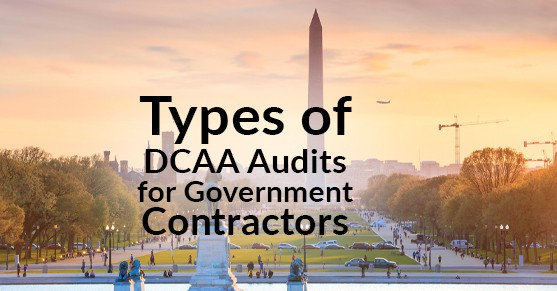SUMMARY:
Government contractors must maintain precise accounting and labor standards to survive various Defense Contract Audit Agency (DCAA) reviews, which range from initial system validations to unannounced floor checks.
- Accounting System Reviews verify financial compliance through Pre-Award surveys and Post-Award audits to ensure systems can handle government contract requirements.
- Labor Evaluation Audits utilize real-time, unannounced floor checks to strictly validate timekeeping accuracy and prevent fraudulent labor charges.
- Incurred Cost and Public Voucher Audits monitor billing consistency and allowable expenses to finalize reimbursement rates and prevent cost misallocation.
Contractors that nurture a culture of daily accuracy and consistency across their business systems effectively minimize the risks and penalties associated with these mandatory government assessments.
Table of contents
We talk a lot about DCAA “audits” in the government contracting sector, and it’s more or less an umbrella term for the full arrangement and types of DCAA reviews. There are quite a few, and we’d like to help you understand the more important ones, including Accounting System Reviews, Labor Evaluation Audits, Incurred Cost Audits, and a few more. And although these are the most common, you’ll see that there’s a DCAA audit for almost every accounting situation.
DCAA Accounting System Audits
We can’t stress enough the importance of a well-designed and accurate accounting system for government contractors. Before approving any funding, government agencies prioritize appropriate accounting processes and verify that a government contractor follows them to a T. After a request from a contracting officer, the DCAA confirms proper accounting practices with two primary accounting system reviews:
- Pre-Award Audit: The pre-award audit lays the groundwork for the DCAA to confirm that an organization has an accounting system that can handle the contracts the contractor is seeking. We’ve talked about the audit and pre-audit process in previous blogs regarding things like SF 1408 Pre-Award Surveys. After the pre-award survey is completed, the DCAA will review the contractor’s accounting system, their inner processes, and practices, and confirm the applicability of the system.
- Post-Award Audit: Now, post-award audits are a little different and happen at a much later time than the Pre-Award Audit. The DCAA conducts Post-Award Audits after the contractor has been working on the awarded job for roughly three to six months, generally. In many ways, the Post-Award Audit is a sort of check-in from the DCAA to ensure the contractor’s accounting system and practices align with the contract’s requirements. They do a more thorough job reviewing accounting items, testing the system and data entry, transaction testing, invoicing, and so forth.
DCAA Labor Evaluation Audits
The GovCon365 blog has various posts in which we outline the “when the DCAA comes knocking” situation, and this is based on the Labor Evaluation Audit. These audits are performed in real-time with the daunting accountability of a floor check. The DCAA comes in and conducts an in-depth review of the labor processes and documentation around one of the fraudulent areas of government contracting: timekeeping.
Because service-oriented contracts have reimbursable labor charges, there’s a heightened need for accuracy around timekeeping and time tracking for all employees. In this audit, the DCAA confirms employee hours, time entry data, charge code processes, timesheet creation and submission, the approval process for managers, and a whole lot more. Because the DCAA does these audits unannounced, there’s a real importance of time tracking the right way every single day. If another employee can access someone’s timesheet (i.e., clock in/out for them), cross-contract charges are inconsistent; there’s an abundance of overrides on timesheets or any of the other deficiencies, contractors will see significant penalties.
With Labor Evaluation Audits, it’s crucial to do it right the first time. You want to nurture a culture of honesty and consistency with all employees, and if you can succeed in that, these audits will be a breeze.
DCAA Public Voucher Audit
Public Avouchers, or “Progress Payments,” have a lot of variety, as most contractors tend to define the parameters of what they want in their invoices; however, the DCAA looks for all the same requirements across the board. Billing the government calls for detailed documentation, especially for progress payments, where the DCAA looks for consistency in accounting records and billing. Some of the more prevalent items auditors look out for include:
- Accurate projections and invoices for the billed and received costs.
- Invoices are per the contract terms and conditions.
- Uniformity around labor distribution and payments to vendors/subcontractors.
- The full list of requirements can be found here.
Incurred Cost Audits
Contractors are required to send in all incurred costs and related documentation to the DCAA for review and approval. Once the submission has been processed and accepted, the DCAA will conduct a relatively brief review of the accounting system, running tests, checking direct and incurred costs, and confirming the adequacy of allowable expenses. The findings highlight key components to identify the company’s rates, including fringe, overhead, and G&A rates, which then help the DCAA finalize reimbursable contracts (fees are also invoiced and paid after the incurred cost audit).
Other DCAA Audits
If a contracting officer is concerned or skeptical about a company’s accounting system’s stability, concerns typically revolve around misallocation of costs or false charges to the government agency. In these circumstances, the DCAA will review the contractor’s Cost Accounting Standards (CAS) compliance, business systems, and any other operations related to the Truth in Negotiations (TIN) Act.
COs may also call for an Audit when cost or job adjustments were made to a given contract, or the contract itself was terminated before the completion of said project. These are red flags for COs, and the DCAA will be especially cautious as they review the internal documentation and complexity of termination. (For more information on the other types of DCAA Audits, click here.)
If you have any questions or comments on the various types of DCAA audits, feel free to put them in the comment section below or reach out to us here.

